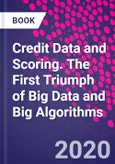Credit Data and Scoring: The First Triumph of Big Data and Big Algorithms illuminates the often-hidden practice of predicting an individual's economic responsibility. Written by a leading practitioner, it examines the international implications of US leadership in credit scoring and what other countries have learned from it in building their own systems. Through its comprehensive contemporary perspective, the book also explores how algorithms and big data are driving the future of credit scoring. By revealing a new big picture and data comparisons, it delivers useful insights into legal, regulatory and data manipulation.
Please Note: This is an On Demand product, delivery may take up to 11 working days after payment has been received.
Table of Contents
1. When Our Reputation Became our Score2. The Credit Industry3. CRAs Losing Battles to Win the War4. My Credit Report5. Historic Complaints about Credit Accuracy6. Differences in Credit Data Between Bureaus7. Differences in Credit Scores between Bureaus8. The Mystery of Credit Scores9. Making a Credit Score10. Picking the y Variable, Picking the x Variables11. Calculating Weight of Evidence and Information Value12. Regressions13. Getting a Good Model14. Data Flows: The Road to Attributes and Scores15. The War Between Individuals and Algorithms16. Protecting Data17. About the Authors
Appendix1. Credit Laws / Data Laws2. My Credit Report








